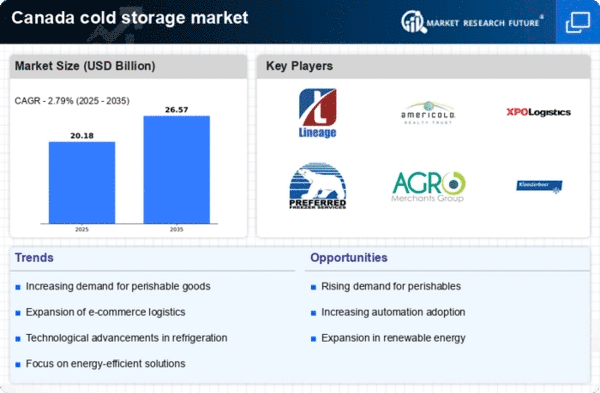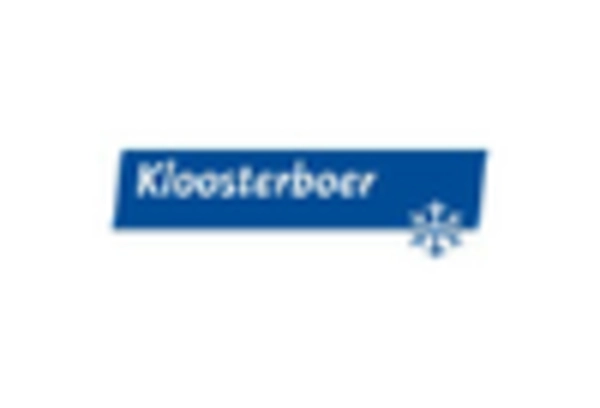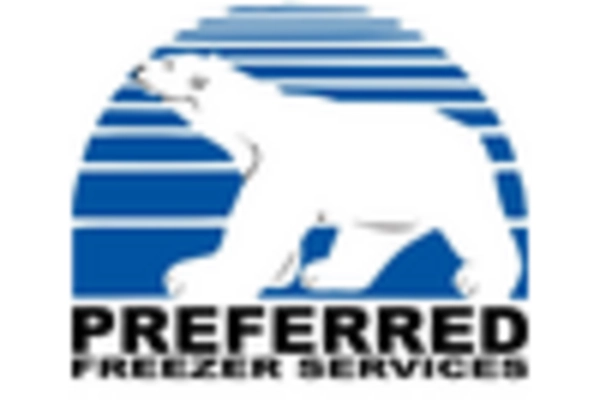Expansion of the Food Supply Chain
The evolution of the food supply chain in Canada is significantly impacting the cold storage market. With the rise of food distribution networks and logistics companies, there is an increasing need for temperature-controlled storage solutions. The cold storage market is expected to benefit from this expansion, as it facilitates the movement of goods from producers to consumers. In 2025, the Canadian food logistics market is estimated to reach $25 billion, indicating a robust demand for cold storage facilities. This growth is driven by the need for efficient inventory management and the ability to respond quickly to market fluctuations, thereby enhancing the overall efficiency of the food supply chain.
Rising Demand for Perishable Goods
The increasing consumption of perishable goods in Canada is a primary driver for the cold storage market. As consumers become more health-conscious, the demand for fresh fruits, vegetables, dairy products, and meat has surged. According to recent statistics, the food and beverage sector in Canada is projected to grow by approximately 3.5% annually, leading to a heightened need for efficient cold storage solutions. This trend necessitates the establishment of more cold storage facilities to ensure the safe and extended shelf life of these products. Consequently, the cold storage market is likely to experience significant growth as businesses seek to meet consumer demands while maintaining product quality and safety.
Growth of the Pharmaceutical Sector
The pharmaceutical sector in Canada is experiencing rapid growth, which is significantly influencing the cold storage market. With the increasing demand for temperature-sensitive medications and vaccines, there is a pressing need for specialized cold storage facilities. The cold storage market is likely to expand as pharmaceutical companies require reliable storage solutions to maintain the efficacy of their products. In 2025, the Canadian pharmaceutical market is projected to reach $30 billion, underscoring the importance of cold storage in ensuring the safe distribution of medical products. This trend highlights the critical role of cold storage in supporting public health initiatives and the overall healthcare system.
Regulatory Compliance and Food Safety Standards
Stringent food safety regulations in Canada are a crucial driver for the cold storage market. The Canadian Food Inspection Agency (CFIA) enforces strict guidelines to ensure the safety and quality of food products. As a result, businesses are compelled to invest in cold storage solutions that comply with these regulations. The cold storage market is likely to see increased investments as companies strive to meet compliance requirements, which may include maintaining specific temperature ranges and monitoring storage conditions. This focus on food safety not only protects consumers but also enhances brand reputation, thereby driving further growth in the cold storage market.
Technological Integration in Cold Storage Solutions
The integration of advanced technologies in cold storage solutions is transforming the market landscape in Canada. Innovations such as IoT-enabled temperature monitoring systems and automated inventory management are becoming increasingly prevalent. These technologies enhance operational efficiency and reduce energy consumption, which is vital for businesses aiming to lower costs. The cold storage market is expected to grow as companies adopt these technologies to optimize their storage capabilities. In 2025, the market for smart cold storage solutions is projected to reach $1.5 billion, reflecting a growing trend towards automation and efficiency in the sector.

















